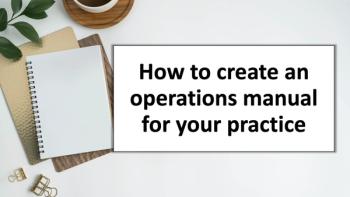
Dealing With Drug Reps
How to manage and get the most from pharmaceutical sales associates
Pity the doctors of Coventry Family Care in Pottstown, Pa. The 12-physician family medicine practice fends off 10 to 15 pharmaceutical sales representatives a day in each of its four offices -- some of them peddling the same product.
"There are frequent interruptions, even when we try to tell [reps] they can only come in during certain times of the day," says the group's managing partner, Lee Butz, MD. "As many times as we tell them that the doctors are busy and that they're disruptive to patient care, it's often ignored." Even when the doctors do stop to talk with the reps, says Butz, "we're not given a lot of value" for our time.
Sound familiar? That's no surprise. The number of pharmaceutical company representatives calling on doctors' offices has skyrocketed to more than 81,000 in the United States -- a 31 percent jump in just two years. Often, they wait for hours in a doctor's office for the chance at a one- to two-minute sales call estimated to cost the pharmaceutical company $150 to $200. Overall, pharmaceutical companies spend about $1 billion a year selling to physicians.
The companies are willing to spend that kind of money because this method of sales, known as "detailing," works, at least from one perspective. Several studies suggest that the more interactions physicians have with pharmaceutical sales reps, the more they write expensive prescriptions for common problems.
Consequently, busier-than-ever doctors have found their offices so inundated with detailers that some have begun charging for the visits, while others have closed their offices entirely to detailers, foregoing the free drug samples that often provide a rep's "foot in the door." There's even a Web site called No Free Lunch, which encourages healthcare providers to pledge to be "drug company-free."
"They are necessary"
Most doctors, however, would prefer to find a better way to work with the reps, rather than ban them altogether. "They are necessary," admits David Jones, chief operating officer for 12-physician Cardiovascular Specialists in Memphis. "I always hear that with so many new drugs on the market, and indications for specific medications, that the doctors can't keep up, and the pharmaceutical reps play an important role in the educational process."
Then there are the free drug samples, not to be taken lightly in today's economic climate. "For a lot of our patients, that's how they get their meds," says Pat Bolding, MD, of Family Medical Care of Tulsa, Okla. "It's also beneficial to give samples before you write a prescription, particularly if it's an expensive drug." In fact, 92 percent of physicians said they had received and distributed free drug samples, according to a Kaiser Family Foundation study, which also found that 59 percent of physicians said the information drug industry reps provided about treatment or diseases was "somewhat useful."
And some 60 percent of doctors admit they've enjoyed the perks that used to come with those detailer visits -- expensive meals, event tickets, or golf outings.
All that is ending, though. As of this past July 1, nearly every pharmaceutical company in the country had agreed to comply with strict, albeit voluntary, marketing guidelines from industry trade association Pharmaceutical Research and Manufacturers of America (PhRMA). That means it's even more critical now that doctors establish policies and guidelines to ensure an ethical, informative, yet not too time-consuming relationship with pharmaceutical sales reps.
Setting parameters
Until recently, Charles Gorey, MD, put up with the 15 to 20 pharmaceutical reps who traipsed through his three-physician office each week. "It was getting out of hand," says the Philadelphia-area family practitioner. So he told reps they were welcome to schedule a lunch, but that they could no longer meet the staff during office hours.
"That's more effective," he says. "At least you have time to talk." Medical consultants and administrators say more offices should set a clear policy, as Gorey did.
That's what Family Practice Associates of Lexington, Ky., did, too, when the "traffic jams" of sales reps grew too large in its nine-practitioner office. "It was very difficult to anticipate the number that would arrive at any given time," says administrator Susan Miller. So last summer, the practice limited visits to six a day at scheduled times on Tuesdays, Wednesdays, and Thursdays. If they want to detail the doctor, they must make a separate appointment with the receptionist.
"Most accepted the limitations well," says Miller. "Hopefully, they understand our main focus is taking care of patients while safeguarding patient confidentiality and valuing the patients' time by
staying on schedule." The office also designated an area in which the reps can wait, and publishes the sign-up list for its physicians in case any have questions for a specific rep.
At Columbus Oncology Associates in Ohio, where administrator Ruth Lander compares the reps who target her eight-physician office to a "swarm of bees," detailers are forbidden from talking to physicians in the office during the day. "If they have a new drug or new indication, they get scheduled at the end of one of our biweekly physician meetings and have five to 10 minutes to present their information," says Lander.
Responding to needs
At California Cancer Care, near San Francisco, drug reps have to go through administrator Harvey Bichkoff before reaching any of the group's 10 doctors.
"We want clinical information if they have updates on their drugs, or new data that might be helpful for new indications," he says. If the rep can provide that, he'll call in the appropriate doctor for a brief discussion. If there's something major to discuss that all the doctors should hear, they schedule an off-site lunch.
What frustrates Bichkoff is that many of the companies detailing cancer drugs have begun assigning cancer-specific reps. So if a drug is indicated for several cancers, he may be contacted by several reps, all selling the same drug. "We don't like it," he says. "We don't have the time to see multiple reps."
Still, says Bichkoff, there is one area in which pharmaceutical reps are becoming more valuable. As the reimbursement climate continues to be less than physician-friendly, "they've been incredibly helpful in getting us funded for our services." Sometimes, they provide backup clinical data on the drug to insurance companies, for example.
Providing value
But too often, the perception is that the information the reps give is just plain wrong. In one survey from Forrester Research, 78 percent of physicians said they thought detailers gave biased information.
Doctors have their own suggestions for insuring value. "The ones I like best are those who come in and talk about where the product is positioned, who tell me that because it's a higher cost product, I might not want to use it as a first-line treatment," says Bolding.
In addition to clinical data, reps can help with reimbursement issues, provide cost comparisons, give physicians a heads-up about potential problems with medications -- even those they're not detailing -- and, in some cases, perhaps step in as an emergency computer technician.
At least that's what Aventis pharmaceutical sales rep Corey Nahman, who details doctors in the Long Island area, found himself doing. When one of his doctors had problems hooking up a new printer, Nahman obliged. "Then the doctor was in a good mood and ready to talk," he says.
"Doctors are very smart people, and they know when you're looking at them as a way to harvest dollars. You have to go in with the attitude that 'I'm going to give this guy information or solve a need,'" Nahman says.
Turning to technology
Increasingly, physicians say they'd rather receive drug information via e-mail or on the Internet by logging onto a password-protected Web site through their computer or PDA to receive updated information -- or in some cases, have a live, one-on-one interaction with a sales rep.
"E-detailing" services such as MyDrugRep.com (
"I think it's a cost-effective interaction, scheduled at the physician's convenience that enables the [pharmaceutical company] to get their message across," says Butz. "It meets the needs of a lot of doctors as well as the company."
Debra Gordon can be reached via
This article originally appeared in the November/December 2002 issue of Physicians Practice.
Newsletter
Optimize your practice with the Physicians Practice newsletter, offering management pearls, leadership tips, and business strategies tailored for practice administrators and physicians of any specialty.






